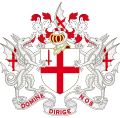 Coat of Arms of the Guild of Freemen | |
| Motto | "Londini Defende Tuos Deus Optime Cives" |
|---|---|
| Location | London, United Kingdom |
| Date of formation | 1908 |
| Company association | Guild of the City of London |
| Master of company | Adrian Waddingham |
| Website | guild-freemen-london.co.uk |
The Guild of Freemen of the City of London is an association of those who hold the Freedom of the City of London.
Membership of the Guild is open to all freemen, regardless of whether they are also members of a City livery company. [1]
The purpose of the Guild, which was founded in 1908, is to bring Freemen of the City together for charitable, educational, benevolent, and social activities. [2] [3] An annual magazine called The Freeman is published in April of each year and includes reports on past and future activities. [4]
With some two thousand members, activities include dinners in notable City of London halls, clubs, and other buildings, an Annual Banquet with the Lord Mayor of London at Guildhall, musical and cultural events, and a carol service. [5]
The Guild has its offices at 4 Dowgate Hill in the City. [6] A Master is elected annually, who holds office for one year. [7] Anne, Princess Royal, was Master in the centenary year of 2008. [1]
